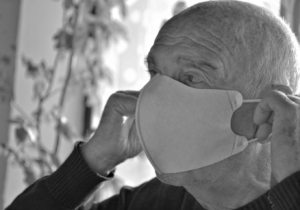The Impact of COVID-19 on Senior Care

COVID-19 has changed the U.S. and the world in countless ways. Among the biggest concerns though has been its effect on seniors. While our understanding of the virus has evolved over time (and continues to evolve even now), one thing that became clear very early on is that the senior population is particularly vulnerable. This has led to various changes either directly or indirectly related to senior care — some of which we’ll delve into below.
Renewed Focus on Home Care
The growing need for home health aides is something we focus on even outside of the context of COVID-19. We have an increasingly large senior population and too few options for those who need regular or around-the-clock care.
The unfortunate problem is that this is not an issue that generates a great deal of attention beyond those who are directly impacted by it. People who have senior family members and people who work in senior care are aware, but by and large, a renewed focus on home care does not come across as any sort of overarching or national priority. The hope now is that while the coronavirus outbreak has been a devastating tragedy, it may shine a lasting light on the needs of our senior population.
As one write-up on COVID-19 and home care put it, the virus has “exposed the vulnerability of nursing homes” and highlighted home care as a “safer and cheaper option than residential care” that “delivers better outcomes for patients.” These points have become clear and indisputable in the time of COVID-19, and have at least sparked a conversation about how governments and providers can work to make home care a more viable option for more people in the senior community.
Greater Demand in Nursing & Leadership
The need for more nurses and more leadership in the nursing profession has been clear for one time now and has even slowly brought about more of a push for learning and degrees in these areas. Nursing remains a very popular pursuit in typical school systems, but the demand is such that it’s also become one of the main subjects for which people pursue degrees online. It’s a rigorous field of study, but a rewarding one — and one that, largely as a result of the need to care for the growing senior population, reliably leads to jobs.
In an online university piece directed at online RN to BSN candidates, it is stated that jobs in nursing are expected to grow by 15% by 2026 (significantly higher than average job growth rates). It is also stated that there is a drastic need for nurses educated to the BSN level, as well as a gap in primary care help that nurses can fill. All of this has been true for a little while now and again relates to the senior population. But if anything, COVID-19 has put these demands into sharper relief. Improving senior care and implementing more home care will require more nurses and more educated leaders in this field.
More Focus on Mental Health Outreach
As part of a renewed focus on senior care, the COVID-19 crisis may also bring about more attention for the mental health and wellbeing of our older citizens. Now, before that calls to mind any sort of false narrative, there has actually been some fairly positive news regarding seniors’ mental health throughout the pandemic. University research on senior wellness has actually shown that seniors have been more resistant to pandemic depression than members of younger generations — reporting less loneliness and even expanding their social networks in some cases.
What we also know however is that those seniors who are struggling with mental wellness are less inclined to seek help for it. A recent survey on older adults and depression found that two-thirds of people in this category are unlikely to seek treatment. This means that even if seniors overall have fared relatively well with mental health during COVID, many who have suffered have gone untreated. This is something mental health professionals will be looking to address moving forward, both by addressing stigmas and by making mental health support more readily available to seniors.
Ultimately the hope is that there is also an overarching shift in priorities toward making seniors more comfortable and giving them more access to affordable care. But where specific changes are concerned, the points above speak to how COVID-19 may meaningfully impact senior care.
Contributed by: Anya Copper
